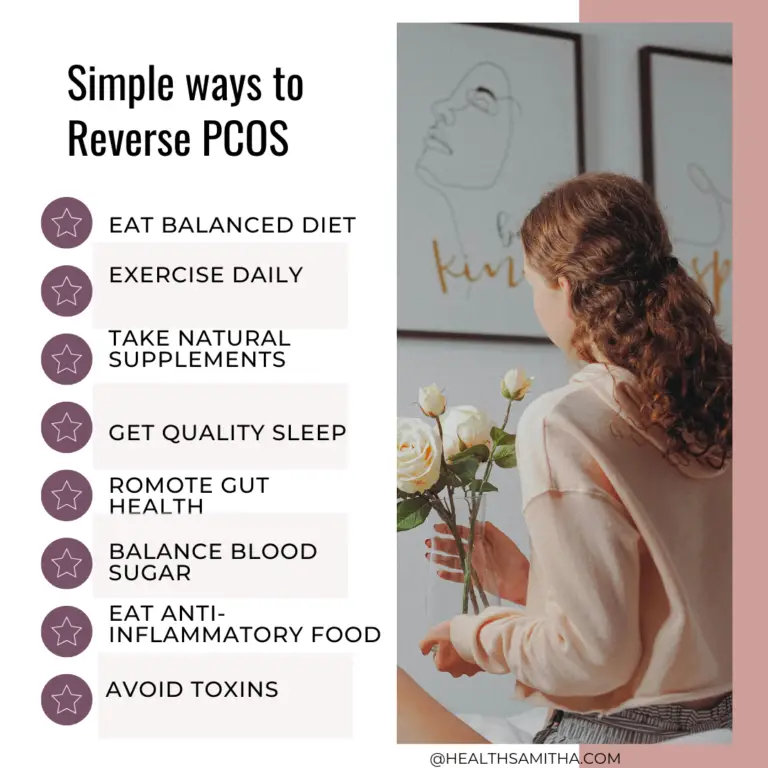Polycystic Ovary Syndrome (PCOS) affects the lives of millions of women across the globe, causing symptoms of irregular periods, weight gain, acne, baldness, and infertility. While there is no permanent “cure” for PCOS, the condition can be significantly improved—and even reversed naturally—by embracing consistent lifestyle changes.
These are the top 12 most important things you can do to naturally manage and reverse PCOS symptoms:
1. Maintain a Low-Glycemic, Balanced Diet
Food is your medicine. Insulin resistance is very much associated with PCOS, and therefore a low-glycemic (low-GI) diet levels out hormone and blood sugar. Eat:
• Whole grains (brown rice, quinoa, oats)
•Legumes and lentils
• Leafy vegetables and colored vegetables
• Healthy fats (nuts, seeds, avocados)
• Plant proteins
Steer clear of refined carbohydrates, sweets, and processed foods since they can cause insulin surging and exacerbate PCOS symptoms.
2. Exercise Daily
Physical exercise helps to regulate hormones, boost metabolism, and improve insulin sensitivity. Add at least:
• 30–45 minutes of moderate exercise daily
• Combination of yoga, strength, and cardio
Even 5 days a week of walking can be a big help.
3. Lose Excess Weight (If Overweight)
5–10% weight loss will regularize menstrual cycles, restore ovulation, and improve fertility. Aim for fat loss, not the scale number. Utilize diet, exercise, and stress management for best results.
4. Manage Stress Effectively
Too much cortisol (stress hormone) will worsen PCOS symptoms. Try:
• Deep breathing or daily meditation
• Light yoga and stretching
• Relaxing music listening
• Friends or family nature or exercise
5. Get Adequate Quality Sleep
Sleep is typically overlooked but necessary for hormone regulation. Poor sleep can increase cravings, insulin resistance, and stress. Attempt:
• 7–9 hours of good sleep each night
• Fixed sleep-wake schedule
• Screen avoidance 1 hour before sleeping
6. Promote Gut Health
Your gut and hormones are closely related. A bad gut can cause inflammation and worsen PCOS. Support your gut in the following manners:
• Fermented foods (yogurt, kefir, sauerkraut)
• Prebiotics (onions, garlic, oats, bananas)
• Adequate fiber and water
7. Attempt Natural Supplements
Following consultation with a medical professional, take:
• Inositol (Myo & D-Chiro) – assists in insulin and ovulation control
• Vitamin D – often deficient in women with PCOS
• Magnesium & Zinc – nourishes hormones
• Omega-3 – inhibits inflammation and stimulates fertility
8. Balance Blood Sugar
Stable blood sugar = stable hormones. Tips:
•Add protein to every meal/snack
• Don’t skip meals
• Eschew sugary drinks (attempt water or plant teas)
Attempt to consume every 3–4 hours to prevent insulin spikes and crashes.
9. Avoid Endocrine-Disrupting Toxins
Certain chemicals mimic or block hormones, worsening PCOS. Avoid:
•BPA (especially plastics)
• Non-stick cookware
• Harsh chemical cosmetics
• Typical cleaning agents
Switch to glass, stainless steel, and clean beauty products.
10. Monitor Your Cycle
Knowledge is power. Utilize period tracking apps such as Clue, Flo, Health ( for IOS users, built-in app) or My Calendar to:
•Know your body’s rhythm
• Monitor moods, ovulation, daily routines, and symptoms
• Identify changes from lifestyle improvements
11. Eat Anti-Inflammatory Food
PCOS is an inflammatory disorder, so decrease inflammation with:
• Turmeric, ginger, leafy greens, berries
• Walnuts, flaxseeds, and chia seeds
• Green tea and herbal infusions
Remove inflammatory triggers like junk food, processed meat, and excess dairy (if intolerant).
12. Be Consistent and Patient
Reversing PCOS takes persistence and patience. Don’t expect overnight changes. Instead, build habits that stick:
•Establish realistic goals
• Notice small gains (e.g., more energy or consistent periods)
• Remain committed even when progress is slow Remember, consistency beats perfection.

Last Reflections Reversing PCOS naturally is 100% possible if you go at it on a holistic level. Your body is ready to heal—you just need to provide it with the right tools. Diet, exercise, stress reduction, and sleep are not things you can bypass on — they’re the tools of your recovery.

